This post may contain affiliate links. If you use these links to buy something we may earn a commission. Thanks.
I remember it seeming impossible that mulch could turn into that dark crumbly stuff people call compost. After years of gardening now I’ve seen it, and do believe it! Even with fresh wood chips.
Eventually, all mulch turns into compost and will no longer suppress weeds. The time it takes for mulch to break down depends on the material type and if fungus or bacteria dominate the process. To slow the breakdown of mulch, avoid mixing it with nitrogen-rich materials to keep bacteria at bay.
If you want to make regular compost with mulch, you’ll need to add ingredients to speed up the process.
If you want mushroom compost, better for perennials than annuals, add mushroom spawn to your mulch! See: Grow a Mushroom Garden at Home in 4 Steps. This is a slower process that yields nutritious and medicinal food while you wait.
How do you make compost out of mulch?
We’ve made compost out of various types of mulch including straw, woodchips, and leaves. While various material types take more or less time to decompose, the same processes can be applied to them all.
The easiest way to compost mulch is slow but passive. Mix any (disease and seed-free) materials you have and give it 2-3 years. Aerate the pile when you can, and keep it moderately moist. Passive composting can harbor pathogens and diseases and doesn’t have a defense against added weed seeds.
The good news is a quick method of composting exists, and it pasteurizes the medium in the process.
How do you speed up the decomposition of mulch?
Without the help of heat, fresh mulch can take a long time to change.
The fastest way to compost any organic mulch is to make a hot compost pile. Eyeball the material you have for the pile to calculate a 25:1 C:N ratio. With oxygen, 50% moisture, and the right mix of carbon to nitrogen compounds, aerobic bacteria can quickly consume mulch until it’s compost.
To manage a hot compost pile and help mulch decompose faster:
Monitor smell and temperature.
If it stinks, add carbon material.
If it doesn’t get hot, add water (if moisture is lacking), and use a pitchfork to flip the pile so that all the mulch can continuously gain exposure to oxygen.
Finally, cover the pile between turning to retain moisture.
A hot pile wouldn’t be dry, still, or have too much carbon.
A stinky cool pile can be overly moist and has too much nitrogen.
Hot composting takes a lot of manual effort to achieve efficient results, but compost quality is worth it for some gardeners.
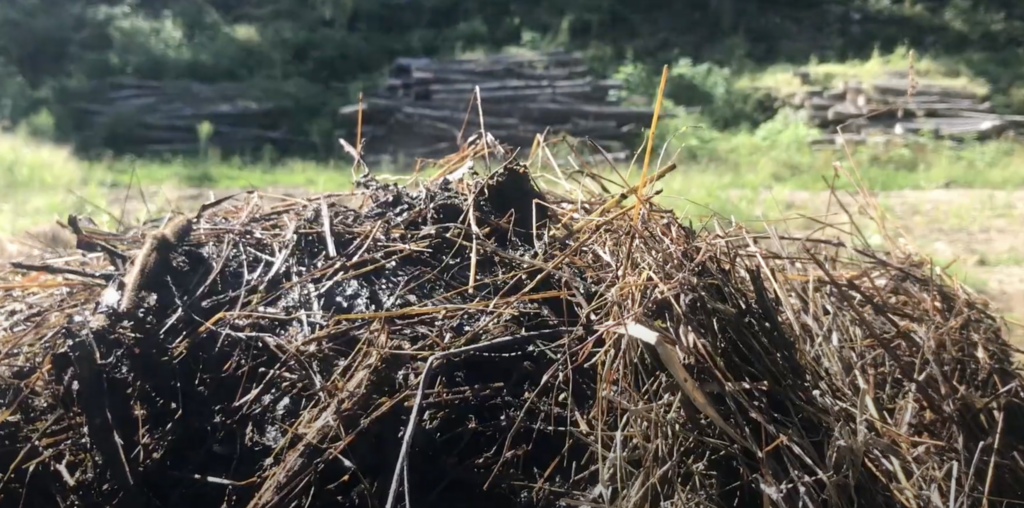
Years ago now, we made our first hot compost pile out of straw, weeds, and urine. Weeds are roughly composed of 25-carbon:1-nitrogen on their own. So nitrogen-rich urine was used to balance out the high carbon ratio of oat straw (48-carbon:1 nitrogen).
After creating a pile at least 3 feet by 3 feet; let it sit for 3-4 days. Turn or “flip” the compost heap nearly every day for 1-2 weeks to keep it hot. Temperatures will rise and peak at about 180F, hence the name hot compost, and kills many unwanted pathogens and most weed seeds become unviable.
Everything you added to the pile (including the mulch) will be practically broken down after this 2-week process. If you started with a material of large particle sizes, such as long strands of straw or coarse bark mulch, it may take additional time to complete. If you began with finely chopped and shredded materials, they are most likely to decompose within 2 weeks.
Since then, we’ve honestly only done hot composting a handful of times. It is a lot of work when you have a lot of other things to do. If you plan to try hot composting for yourself, my experience suggests you try both compost types at the same time to ensure you have a backup option should hot composting be too much for you to take on. That way, you’ll still end up with enough compost when you need it.
Once finished, your compost will have plenty of available nutrients for plants over the next 1-2 years. During this time, humus is next in line!
How will composted mulch become humus?
Composted mulch will slowly become humus as nutrients are used. To compost mulch until it becomes humus, give it 4-7 years from fresh. The composting process can complete within a year by adding nitrogen sources for bacteria to feed, aerating the pile frequently, and maintaining 50% moisture.
The remaining time is a slow transition fueled by fungi. All you need to do is annually top up the compost and humus will eventually build up beneath. Building humus will build you a rich root-friendly medium that clings onto nutrients and water molecules—Essential characteristics that allow plants to thrive.
The awesome thing about building humus beneath fresh applications of compost; is many nutrients in fresh compost that would otherwise leech away during the rain, will trickle down and be captured in the humus below.
This article was originally published on foodforestliving.com. If it is now published on any other site, it was done without permission from the copyright owner.
How long does it take for mulch to decompose?
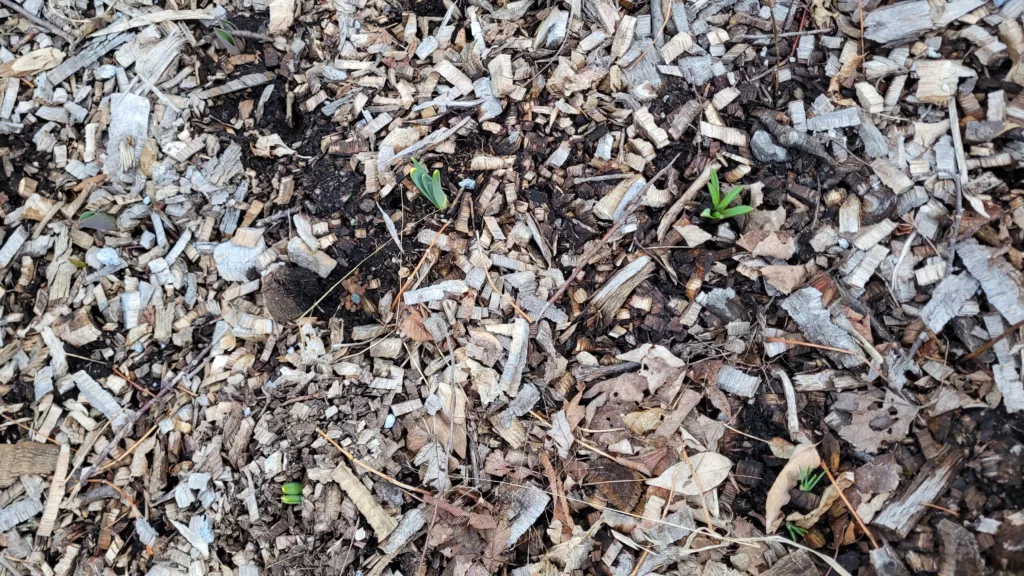
The rate of mulch decomposition varies based on climate, environment, and effort. Mulch lasts longer when using it to suppress weeds than when using it as an ingredient for intentional compost.
Expect mulch to suppress weeds for 1-7. Woody mulch made from bark or chips will take 4-7 years to decompose, and straw or leaf mulch will decompose within 1-3 years.
When using mulch to suppress weeds, you can expect the effects to last longer.
When mixing mulch to make nutrient-rich compost, it can decompose in as little as 2 weeks to 2 years.
Either way, the speed depends on the materials chosen and the effort put in. The effort put in is between cold (passive) compost and hot (effort) compost. A hot compost will always be faster.
Below are the details of how long it takes bark, wood chips, straw, and leaves to:
- decompose when used as mulch, and
- how long they take to compost intentionally
How long does bark take to decompose?
Coarse bark is effective as mulch for up 7 years and is best for perennial and evergreen settings. This long-term mulch can affect the pH of the soil and tie up nutrients for the whole time it takes to degrade.
How do you turn bark into compost?
If you use bark mulch for your compost pile it will take longer to finish composting than all other options below.
Fresh coarse bark can take up to 4 years to decompose in an intentional compost. Hot compost will speed it up, but for the length of time bark mulch takes to fully break down it isn’t worth composting bark at home if other material options are available.
How long do wood chips take to decompose?
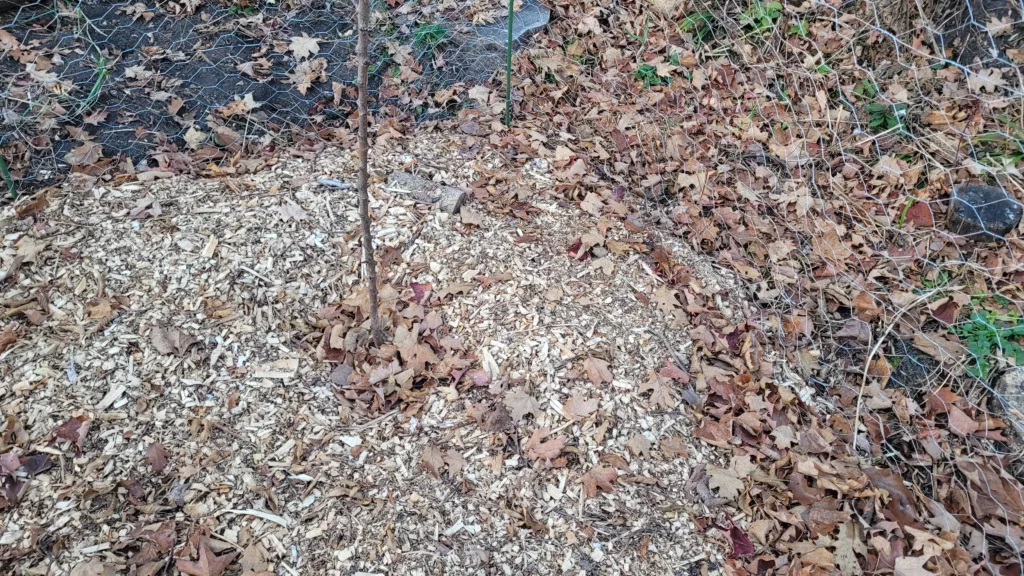
Wood chips decompose whether they are used as mulch or as an ingredient in a compost pile. Wood chips take longer to decompose when used as mulch.
On average, wood chips decompose in 5 years when used as mulch. The wood type and environment affect the breakdown speed. For example, pine wood is a softer wood type, so pine chips have a shorter lifespan than dense oaks, maples, or cedars.
All wood types are more or less dense in structure than others which means they last for more or less time.
A moist environment will also increase the rate of wood chip decomposition.
In a mixed compost pile, wood chips would be exposed to more biological activity and would be consumed faster than if the chips are a simple layer on the surface of the ground. The surface of the ground tends to dry from the sun. Dry mediums aren’t consumed quickly.
How do you turn wood chips into compost?
You can turn wood chips into compost by balancing the ingredients for a 25:1 carbon-to-nitrogen ratio, keeping it moist, and aerated. In general, it takes between 1-2 years to decompose in an intentional passive or hot compost.
How long does straw take to decompose?
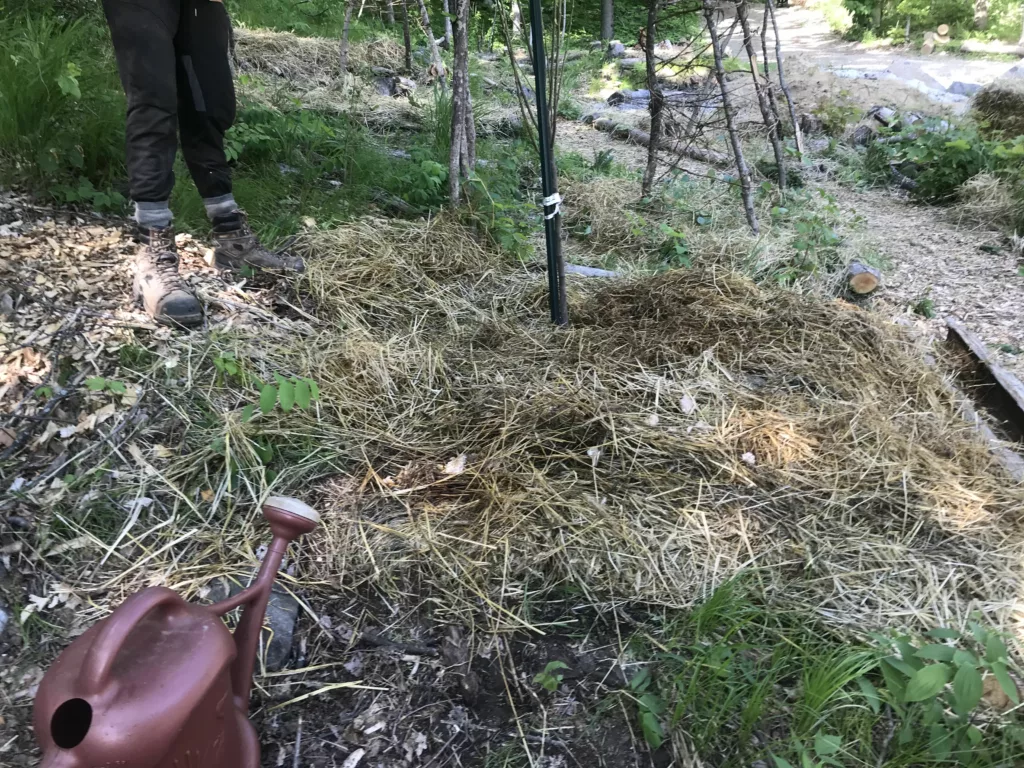
Straw is effective as mulch for about 2 seasons. It doesn’t look the prettiest, but it’s suitable for mulching annuals since it breaks down relatively fast.
How do you turn straw into compost?
Shredded straw can break down in a year or less, especially in an intentional compost. Small particle sizes break down faster because of the increased surface area exposed to the air.
How long do leaves take to decompose?
Leaves are effective as mulch for a season. They look gorgeous but are very temporary, especially in thin layers. If you are dedicated to mulching an area with leaves every year, it’s a nourishing option for any area.
How do you turn leaves into compost?
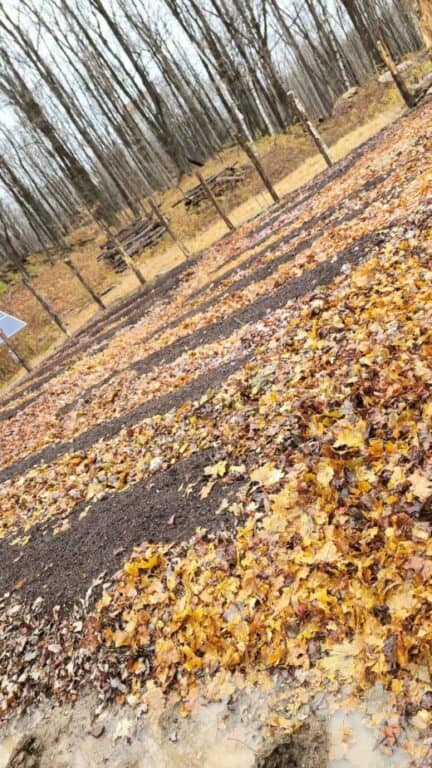
Shredded leaves can easily break down within the 2-week period of hot compost. Even in cold compost, shredded leaves can break down in a few months while whole leaves may take up to a year.
Related post: Mulch vs Compost vs Fertilizer (When to Use What)
So if you’re looking for long-lasting mulch, bark, and wood chips require the least maintenance.
If you’re looking to make some good compost; straw and leaves will be ready to use sooner than later. Shred them both before adding them to the compost and they’ll break down twice as fast.
We love composted wood chips too though! So while you make short-term compost, you can also make a long-term compost pile if you have space.
What turns into compost the fastest?
Shredded paper and grass clippings in a large heap will decompose the fastest as a hot compost. Leaves and straw are second to paper but will deteriorate faster than woodchips. The key for any ingredient to decompose as fast as possible is shredding and compost maintenance.
Will mulch break down into soil?
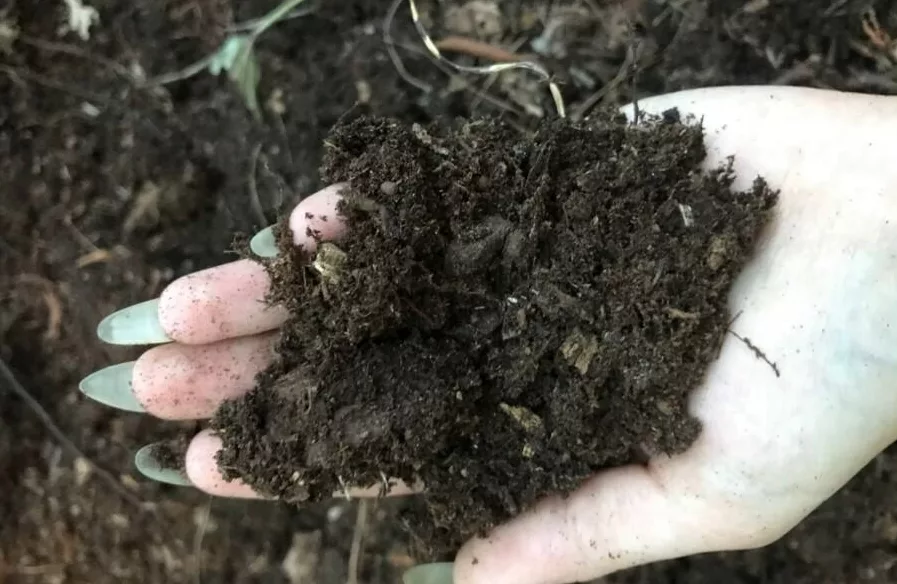
All organic mulch breaks down and eventually turns into soil. Mulch will become ineffective at suppressing weeds as it becomes compost. Below the compost layer, is what used to be composted mulch, but is now soil. As mulch is topped up every year, the layers of mulch, to compost, to soil will keep building.
Recent Posts
There’s no shortage of full-sun ground covers for zone 4 climates! Each plant in this list can withstand the frigid temperatures and also enjoy the hot sun in summer. Full sun means that a plant...
There's no shortage of full sun ground covers, not even in zone 3! Zone 3 climates offer hot but short-lived summers and very cold winters. So each plant in this list can withstand the frigid...
